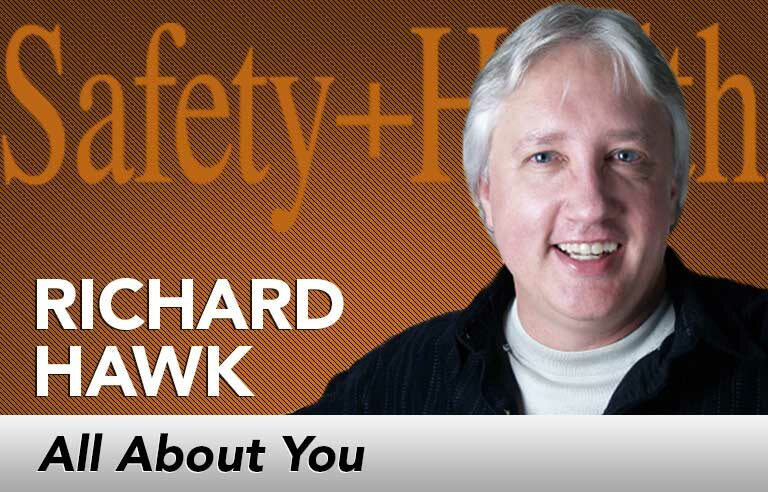All About You: The power of laughter

EDITOR’S NOTE: Motivating employees to work safely is part of the safety professional’s job. But who motivates the motivator? In this monthly column, veteran safety pro and professional speaker Richard Hawk offers his entertaining brand of wisdom to inspire safety pros to perform at their best.
Laughter is one of life’s greatest joys. Besides feeling good, a hearty laugh relieves stress and may boost your immune system. Even during tragedies and emergencies, humor and its physical response – laughing – can ease tension. And when people laugh together, it strengthens their relationships and bond as a group. If emotions are running high during a disagreement, an amusing phrase or funny, absurd reaction can help dissipate the negative energy.
In the 13th century, surgeons used humor to distract patients during surgery. Today, laughter or “humor therapy” is employed by a variety of hospitals and cancer centers to help patients handle pain and improve their health. According to the Mayo Clinic, “Laughter may ease pain by causing the body to produce its own natural painkillers. Laughter may also break the pain-spasm cycle common to some muscle disorders.”
I’m a humor junkie. I know oodles of jokes, funny poems, quotes and goofy songs. I don’t include them much during my talks, although I do tell humorous stories and get laughs through interaction with the audience. It’s when I’m with people off the stage that I use my cache of memorized comedy.
As a full-time safety professional, I did the same thing with work crews and associates. Of course there are times when it’s inappropriate to laugh or say something humorous, such as during the investigation of a serious incident or when you have to discipline someone for a safety violation. But other times we hold back from laughing even though we don’t need to. Usually, it’s for three reasons:
- The general mood where we work is somber.
- We’re afraid we’ll look silly or unprofessional.
- We don’t “practice” using humor or laughing, especially when we’re upset.
You may not be able to eliminate the first reason, but you can do something about the second and third ones. Here’s how:
If you’re feeling down, watch or read something comical. Emotions are created by your brain, but they can be altered by outside stimuli. Laughing will also perk you up physically. It’s like a mild workout. Research conducted at Loma Linda University in California concluded that “the body’s response to repetitive laughter is similar to the effect of repetitive exercise.”
Seek out people who make you laugh. Tim, a radiation safety technician, was a hilarious co-worker. Even when he was having troubles in his life, the way he described them was like a comedy routine. I would visit him at work whenever I could, and it always brightened my spirits. No doubt, there are people you know who are naturally funny. Hang out with them when you can.
Try to find the humorous side of things. There’s nothing more relieving than to laugh while the pressure is on. Case in point: At a National Safety Council Congress & Expo in Philadelphia, I met Rob, who sold and set up communication equipment for rescue operations. He told me it’s common for rescuers and trapped miners to joke with each other. During one cave-in, when the miners were contacted the responding miner quipped: “We better get overtime pay for this!” Rob said everyone laughed, and it helped relieve the tension. He told me it also made it seem like everything would be all right.
Don’t be ashamed to laugh. A competent safety professional who laughs a lot or is funny can be a smart combination. In fact, being able to find humor in day-to-day situations is linked to emotional intelligence that can help you perform better at work. You just have to avoid offensive comedy and know when it’s not an appropriate time to laugh or joke around.
Dr. Paul McGee, a humor researcher, writes that “This (humor) is especially important on the job, where chronic complaining and negative emotion can quickly undermine morale and reduce productivity.”
Finally, something for your calendar: Mark down Jan. 24. It’s “Global Belly Laugh Day!”
Richard Hawk helps companies around the world create more vibrant safety cultures by showing them how to make safety fun. As a professional speaker, author and musician, he also inspires employees to focus better and enlightens safety leaders about ways to increase their influence. To learn more about Richard, visit www.makesafetyfun.com.
Subscribe to the podcast feed in iTunes
Post a comment to this article
Safety+Health welcomes comments that promote respectful dialogue. Please stay on topic. Comments that contain personal attacks, profanity or abusive language – or those aggressively promoting products or services – will be removed. We reserve the right to determine which comments violate our comment policy. (Anonymous comments are welcome; merely skip the “name” field in the comment box. An email address is required but will not be included with your comment.)

